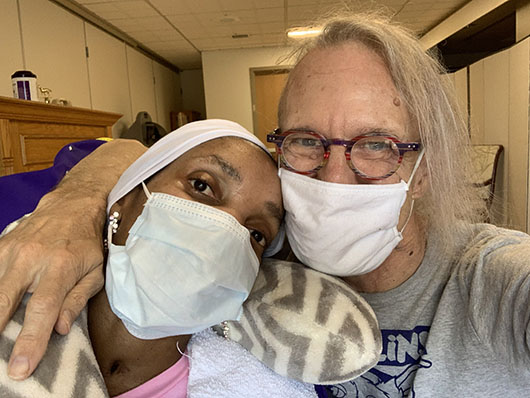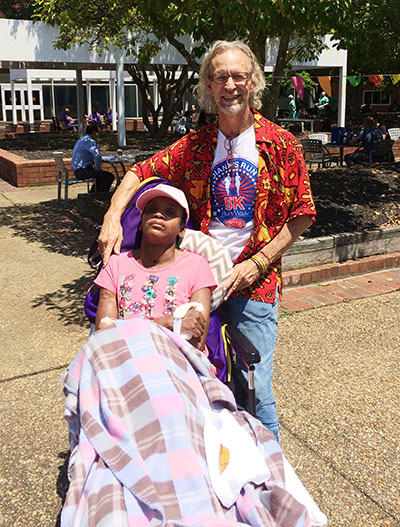A Friendship Deeper Than the Ocean: Civilian Cares for Coast Guard Best Mate After Catastrophic Injury

By Allison Scott
When I began working with Diana and Marty through the Independence Program in 2018, I had no idea how much joy I would gain by having a front row seat to a beautiful friendship. Caregiving is a passion of mine – having assisted with the care of my father, a disabled Army veteran, for the last five years. Seeing Marty's dedication in action year after year and how this support has improved Diana's quality of life is truly something special - something worth celebrating. They are an extraordinary example of what the military and veteran caregiver space can look like today.
– Allison Scott, Independence Program Specialist at Wounded Warrior Project
The drive from Tacoma Park, Maryland, to the Hunter Holmes McGuire VA Medical Center in Richmond, Virginia, might seem long to most people. But for Marty Drake, it is worth the effort just to see a smile in the eyes of Coast Guard veteran Diana Isidore.
Having met while working together at United States Coast Guard headquarters, Marty and Diana’s bond was first founded in a mutual commitment to service and country. That bond has since grown into a friendship that will not only last a lifetime but sets the bar high for dedication and selfless service.
Diana is a medically retired lieutenant in the Coast Guard. She has two master’s degrees and was the first woman from St. Croix to graduate from the Coast Guard Academy (2006).
In January of 2015, while still on active duty, Diana took a break to go on a trip to Panama. While traveling with friends there, she was catastrophically injured in an accident. Three people, including Diana, were ejected from the vehicle as it plunged off the edge of a road. The other two died. Diana suffered multiple fractures and a severe traumatic brain injury, leaving her nonverbal, immobile, and dependent on others for her daily needs.
With family far away, Marty, who still works for the Coast Guard as a civilian employee, answered the ultimate call of friendship to be Diana’s voice. Over the years, Marty has transformed into a steadfast caregiver and advocate for Diana’s well-being and quality of life.
The Hunter Holmes McGuire VA Medical Center, where Marty regularly visits her, became Diana’s home following her accident. While the VA treatment team meets her basic medical and physical needs, Marty monitors the quality of care and helps Diana maintain connections with friends and family through social media. Marty also collaborates with the Independence Program at Wounded Warrior Project® (WWP) to provide life-enhancing services for Diana.
A piece of the WWP Independence Program team is Danielle, a community support specialist who meets with Diana weekly. From guided meditations to virtual field trips, Danielle is a big part of helping Diana live her life to the fullest. Further still, Danielle is there to support Marty as a caregiver. In taking time to engage and work with Diana, Danielle relieves Marty and offers reassurance that Diana has others in her corner.

“I have capable partners in her care at Wounded Warrior Project,” Marty said. “The Independence Program is the best support for me.”
Marty continues to be there for Diana, reading to her and communicating via a letter board, as well as continuing to work full time. Marty meets with Diana’s care team, including her doctors and therapists.
Marty has been the key to unlocking Diana’s silence and reconnecting her to the outside world. Additionally, Marty serves as conduit for the Independence Program to connect with Diana – allowing for case management and community support services to be added to her care team. “I’m very grateful for the Independence Program; it has been a lifesaver,” Marty said.
Most important of all, Marty has been Diana’s unconditional friend. Marty maintains a Facebook page for Diana that has brought together friends from grade school in St. Croix and friends from the Coast Guard. When asked about Diana’s willingness to share updates and photos via social media, Marty posed the question to Diana, who answered with her eyes by spelling on the letter board: “I want other people to know how I’m doing.”
Through WWP services like the Independence Program, veterans like Diana can connect with their community, and caregivers like Marty can get a helping hand. If you are caring for a wounded warrior or know of a post-9/11 veteran in need, learn more about WWP’s Independence Program.
The Independence Program at WWP helps veterans with brain injuries, spinal cord injuries, and neurological conditions – whether caused by combat injuries, non-combat injuries, or medical issues – live as independently as possible. By working with warriors, families, caregivers, and WWP-provided support, the Independence Program helps craft care plans and goals that fit the individual objectives of injured veterans.
WWP also helps warriors and caregivers plan for the future to ensure the needs of the warrior are met even if support from a caregiver is no longer available. The goal is to guarantee that those who raised their hand to protect our country are empowered to achieve independence and engage with their community.
About Wounded Warrior Project
Since 2003, Wounded Warrior Project® (WWP) has been meeting the growing needs of warriors, their families, and caregivers — helping them achieve their highest ambition. Learn more.